Last Updated on December 20, 2022
Estimated reading time: 9 minutes
By Jim Ferri
Trying to find a good deal on a car rental when traveling overseas can be a maddening process.
Car types and sizes differ from what you’re accustomed to in the USA and Canada, and costs can be extravagant. That’s especially true if you plan to return your rental in a different country.
There’s also the issues of whether to pick up your rental inside or outside the airport. And, of course, do you need insurance and which are the most reliable (and less costly) companies.
The key to saving on an overseas car rental is to look at the overall picture. Don’t just consider the cost of the car, although that is important.
If you’re thinking of a road trip on your next overseas vacation, you will do well to read this first.
Shop Around
Say you hire a car at Paris’s Charles de Gaulle Airport for a road trip to the Normandy D-Day beaches.
It’s an easy two-day trip, also doable in one day if you skip other sights along the way. After you return your car at the airport, you can just hop aboard your flight home.
You’d think the cost for such a “simple” rental would be about the same for each of the major companies. It’s not.
For an economy two-door manual such as the Opel Corsa, Hertz charges $121.78, Avis $156.62, and Enterprise $111.29, the latter not for a manual but a Renault automatic. Since most rentals in Europe are for manual transmissions, that makes the Enterprise quote even more valuable.
If you look at smaller rental companies, you’ll find rates even 20-30% lower than the big boys. Research car-rental websites to find these companies.
In exchange for the savings, however, you’ll often have to put up with the inconvenience of traveling off the airport property to get your rental or not always getting assistance expeditiously should you break down.
Don’t Book Direct
In the car-rental business, there are few independents: Avis owns Budget; Hertz owns Dollar, Thrifty, and Advantage; and Enterprise is the parent of National and Alamo. Apparently, there’s a lot less competition than one might imagine.
Seek more competitive pricing by going to a comparison site such as Priceline.com where you’ll have less of a chance of overpaying.
That same two-day trip to Normandy from Paris’s CDG, also in an Opel Corsa, cost a total of $100 on Priceline.
Don’t Opt For the Extras
Like many travelers, I sometimes find a car GPS system indispensable when I’m traveling, since I’m always veering off the beaten path.
The problem, however, is that car rental companies are notorious for nickel-and-diming you, especially when it come to things like GPSs.
For example, in Paris Hertz will charge you $17.49 a day to rent a GPS, Enterprise $10.80, and Avis $15.02. But you can beat them at their own game.
If you travel a lot, it’s worth buying a small GPS, some of which you can use both in your car and while walking. I have a Garmin Nuvi that I purchased on Amazon. Before I travel, I update it with the latest info on roads in North America and Europe. It more than paid for itself in two weeks.
And it’s not only GPSs. For a child seat Hertz charges a whopping $38.50 per day, Avis $11.27, and Enterprise $10.80. That’s quite an expense if you’re traveling with children.
Use Organizational Discounts
Although they don’t advertise it, car rental companies provide an amazing number of discounts to an amazing number of organizations and companies. For example, if you’re a member of AAA, AARP or hundreds of other organizations, you’re entitled to one.
But it doesn’t stop there. There are plenty of other organizations that also qualify, ranging from Costco and BJ’s to the American Bar Association, as well as many airline frequent-flier programs. Also, don’t overlook your insurance company – companies such as USAA provide good price breaks from all of the major rental companies.
Look Online for Coupons and Discounts
Car rental companies often allow you to combine discount codes (such as those provided to members of the organizations noted above) with coupons for a rental.
Go online and Google the name of the car-rental company with the words ”coupon code” to see if you can dig up additional savings.
Inspect That Rental Carefully
Just like the airlines and cruise lines, car rental companies are also determined to get as much money from their customers as possible. It’s especially true in some areas of Europe.
One easy way for them to do this is to inspect returned cars for any little nicks or scratches, which are then charged to the driver at an exorbitant cost.
In fact, some agents are awarded commissions for discovering minor damage on returned automobiles. In Italy, I’ve seen rental agents lie on the floor and look underneath the car for damage done by stones nicking the undercarriage.
So it pays to take a good look before you drive out of the parking lot and bring even the most insignificant scratch to the attendant’s attention. Have him/her note it on the paperwork and then also take a photo of it with the car rental office in the background.
Book Your Rental for “Extra Time”
It’s a guerilla tactic that often works: if you need to rent a car for a week or a few days at the end of the week, extend your rental to part of the weekend – even though you plan to bring it back earlier.
You will become part of the less-expensive weekend promotion, and your hourly rate will then drop. You’ll often be charged the lower weekend rate even though you’ve returned it during the week.
Prepay For Extra Savings
Following the lead of the hotel companies that give you a discount when you prepay your hotel room, car rental companies now do the same if you pay your rental in advance. The discount can be substantial, sometimes ranging up to about 20%.
Don’t Assume You’re Covered
Many people erroneously believe that their rental car is also covered by the insurance they have on their private automobile. While this is often true in the USA and Canada, it is not the case in most foreign countries.
Before you rent overseas, it pays first to make a call to your auto insurer to ascertain your coverage or lack of it. Alternatively, you can just plow through the fine print of your auto insurance policy yourself.
For a more definitive explanation see Should I Buy Insurance When Renting a Car?
Fill It Up Before Returning It
It’s almost always better to return your car with a full tank of gas, rather than allow the rental company to do it for you.
Avis, for example, will fill your tank with fuel at the same cost as “the current local retail pump price.” The problem is that they charge you for a full tank of gas and provide no credit or refund for unused fuel. Return it only half empty and in essence you’re paying double the price at the current local retail pump.
Also at Avis, if you drive your rental less than 75 miles, Avis will add a flat service charge to your bill. If you’ve purchased fuel you can avoid the change by showing a receipt.
Ask Questions
It’s always worthwhile to ask questions before you sign any contract. What do you do in case of a breakdown? Are all fees clearly stated on the contract? Are there other rental facilities along the way where you can change to another car?
One good question often overlooked is whether there are any limitations as to where you are allowed to drive your rental.
A few years ago I rented a car in Berlin for a drive to Prague. But when I went back to the rental office to ask how to use the GPS I was told I wasn’t allowed to drive that model into the Czech Republic because carjackers often target that model.
I quickly switched models.


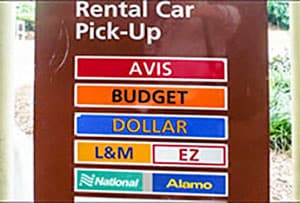
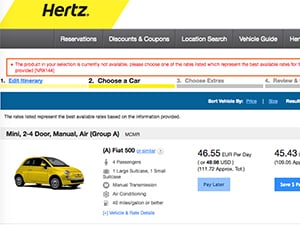
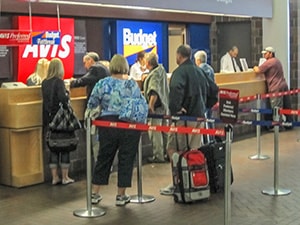
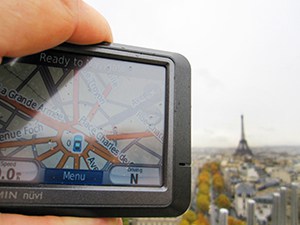

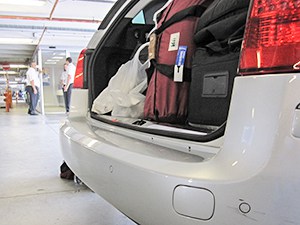

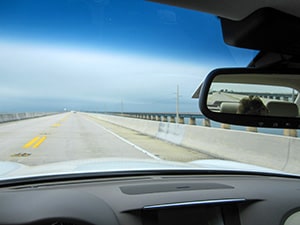
Leave a Reply